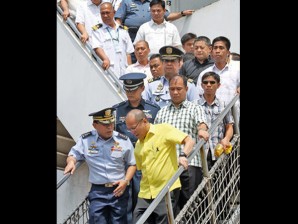Aquino inspects Metro land, air, sea terminals

SAFE TRAVEL President Aquino, accompanied by Coast Guard and transportation officials, inspects a Negros Navigation vessel at Pier 2 in Manila’s North Harbor on Monday. NIÑO JESUS ORBETA
Passenger services at Metro Manila’s major land, air and sea terminals have significantly improved from conditions last year, but more improvements can be done, the Department of Transportation and Communications (DOTC) said Monday.
Transportation and Communications Secretary Manuel Roxas II accompanied President Benigno Aquino III on an inspection tour of Ninoy Aquino International Airport (Naia), Manila North Harbor and the Cubao bus terminal on Monday.
Roxas said Mr. Aquino, who made the same rounds last year, noted improvements at Naia, North Harbor, and the Cubao terminal.
“Last year, there was really chaos. Now, people are queuing properly and we have more security measures,” Roxas said.
Mr. Aquino conducted the inspections before leaving for Cambodia to attend the two-day 20th Association of Southeast Asian Nations (Asean) leaders’ summit.
Article continues after this advertisementThe President told reporters that he was there to check not only security procedures at the terminals but also to see if the terminals provided convenience and safety for departing passengers.
Article continues after this advertisementNorth Harbor
Despite the improvements, Roxas said Mr. Aquino found several problems that he wanted solved immediately.
“One [problem] the President saw was that some of the urinals were not that clean. I will make sure that this is dealt with,” Roxas said.
The President’s inspection started at Manila’s North Harbor, the country’s busiest domestic terminal, at 10 in the morning.
Mr. Aquino, together with Roxas and Philippine Ports Authority (PPA) officials, boarded the MV St. Michael Archangel, a commercial vessel with a capacity of 1,929 passengers that was docked at Pier 2 and scheduled to depart at 3 p.m.
The ship was bound for Misamis Oriental province, with stops at Bacolod, Iloilo and Cagayan de Oro.
Mr. Aquino and Roxas checked if the vessel had enough life jackets, life rings, fire extinguishers, and other emergency equipment and were satisfied with their findings.
Data from the Coast Guard showed that more than 147,000 passengers boarded more than 1,000 vessels that sailed to various destinations nationwide over the past 24 hours (from 6 a.m., April 1 to 6 a.m. April 2).
Terminal 3
By 11 a.m., Mr. Aquino was at Naia Terminal 3. At one point, the President accompanied one passenger to see how long travelers had to stand in line outside the terminal before they could get inside the building.
“Our benchmark is that it should take a passenger ten minutes at most to get into the terminal,” Roxas told reporters.
“The PSG [Presidential Security Group] was already telling the President to get inside because he was exposed outside the terminal. But he wanted to see for himself. Fortunately, it only took them five minutes,” he said.
“[I]t looked like they met their objectives,” President Aquino told reporters.
“We are gradually improving facilities in the airport to better serve our people, especially during occasions like the observance of Holy Week,” Roxas said.
Cubao bus terminal
“We want to advise our people to allot more time when they travel this Lenten season. [They shouldn’t] make their travel plans at the last minute to avoid crowds and reach their destinations as planned.”
The President had lunch with top airport executives before leaving for the Cubao bus terminal.
He arrived at around 1 p.m. for a 30-minute inspection that focused on the random drug-testing centers set up by the Land Transportation Franchising and Regulatory Board (LTFRB).
At the bus terminal, the LTFRB conducted predeparture briefings for some 30 drivers, 11 of whom were also subjected to breath analyzer tests to check if they had been drinking. All the drivers volunteered for drug testing.
The random drug testing, first conducted by the LTFRB on bus drivers during last year’s observance of Holy Week, has become a regular part of the “Oplan Ligtas Biyahe (Safe Journey)” program to ensure safe travel during the Lenten season.
“We are making random drug testing a regular part of our ‘Ligtas Biyahe’ program to make sure our bus drivers are fit to bring passengers to their destinations safely,” Roxas said. “We are doing this to ensure the safety of our bosses: the travelers.”
President Aquino said procedures at the bus terminal were “more systematized, and all the passengers I spoke to were smiling.”
Mr. Aquino noted that even traffic on Edsa was easier. “So far I am much happier and I am confident that the preparations were all good,” he said.